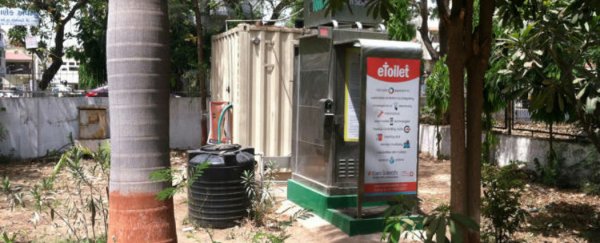The winner of the Bill & Melinda Gates Foundation's 'Reinvent the Toilet' challenge back in 2012, this solar-powered, DIY-friendly system is being rolled out in three locations around the world.
Developed by researchers from the US-based Caltech Group, not only does it transform the sewerage that goes through it into sterilised flushing water, it also seeks to solve one of the biggest issues that arise when new technology is integrated with developing communities - what happens when it breaks down?
"The developing world is full of broken wells, water pumps, and cheap tablet computers," Ben Schiller points out at Fast Company, and the team at Caltech isn't interested in adding busted loo to that list. So they've integrated a series of sensors that pick up when something's amiss, and alert a designated operator with pictures of the parts and processes needed to get it humming again.
"We've been in the field with this sanitation system for a while, and we've noticed that things have a tendency to break down, like any product," lead software developer at Caltech, Cody Finke, told Schiller. "The difference between technology in the developed world and the developing world is that when things break down in the developing world, they don't tend to get fixed. Even with all the spare parts and instructions, people lack the abilities to repair things."
 Credit: The Caltech Group
Credit: The Caltech Group
Cheap, self-cleaning, and easy to install, the Caltech toilet not only recycles the organic waste that runs through it; the team has also integrated a function that can turn the byproducts of the water sterilising process into useable hydrogen and fertiliser. This hydrogen can be stored in fuel cells that power the system when the light is too low for the power cells.
At $15,000 per unit, the price tag might sound exorbitant, but the team says that meets the Gates Foundation's recommendation that it put the cost of sanitation at five cents per person per day, and will end up being much cheaper than the $1,000 per unit a regular first-world toilet system costs to be installed.
The toilets are currently being trailed in three locations around the wold - the Mahatma Gandhi University in Kerala, India; a public space in Ahmedabad, India; and in China, where Fast Company reports a team of engineers are working with the local government to turn a shipping containers space into a public restroom. If all goes well, the plan is to roll them out to schools in South Africa.
"We do expect the mobile maintenance component will bring down the long-term cost," Finke says. "We'll be able to employ people who aren't engineers. Single operators will take care of many systems, which will allow the distributed sanitation solution to scale to need."
We can't wait to see how this turns out. It's been way too long between major toilet innovations and people in the developing world are the ones who suffer the most from the lack of new ideas. "No innovation in 200 years has saved more lives than the toilet," the Gates Foundation states. "But 2.6 billion people still don't have a safe, affordable way to poop."
